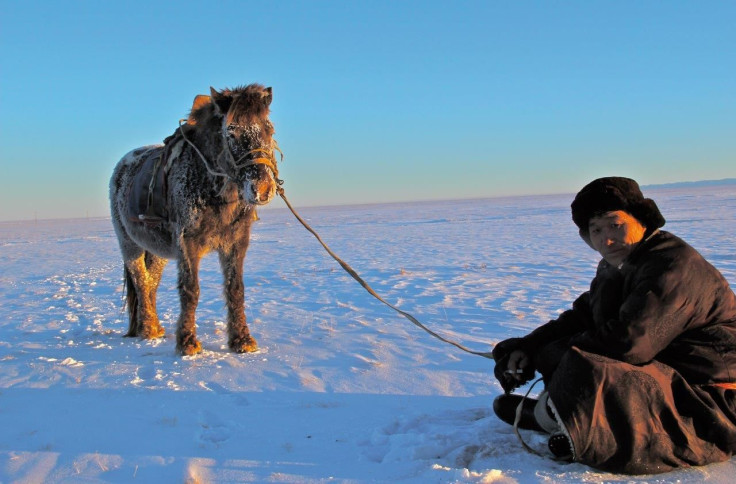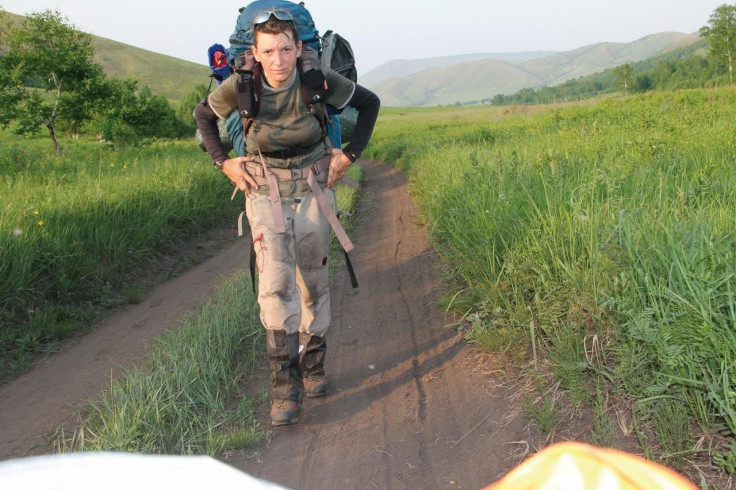Mental Toughness: The Key To A 10,000-Mile Expedition From Siberia To Australia — By Foot

Editor’s note: Sarah Marquis is a National Geographic Explorer and author of Wild By Nature, the story of her 10,000-mile, three year-long expedition through Siberia, Mongolia, China, Thailand, and Australia — by foot. This was no ordinary journey. With water scarce and food a luxury, Marquis faced resistance each day; her mind and body telling her to give up. Each day, we're faced with our own set of challenges that inspire us to charge ahead toward our goals or fall back.
Being aware of these forces at play in our minds — one of resistance and one of encouragement — gives us the strength to deal with these everyday situations, she says. And at the core of this strength is mental toughness, a set of four psychological traits that push us to achieve our goals no matter the circumstances that arise: hope, optimism, perseverance, and resilience.
Marquis says the key to building it is being curious, stepping out of your comfort zone, and taking it a step at a time. "What you have to achieve is the best you can every day." Being positive about attaining your goals, telling yourself you will get "there," meditating, and being as prepared as possible will help you build mental toughness. The more you do it, the stronger, and more confident in yourself handling situations, you will get. Research has shown the benefits of mental toughness include a longer, happier life — presumably by having less stress and stress-related illness — and a lower risk for mental health disorders like depression.
That said, here's a slightly adapted excerpt from Wild by Nature to give you an idea of the challenges Marquis faced.

I approach the camp at the end of the day. Debris is flying everywhere, it’s been devastated. The yurts situated on the butte escaped the flood, but the previous night’s storm got the better of the three others. The proprietor is on the roof of a yurt, trying to stabilize the whole thing with some straps. I put down my things and run to give him a hand. The wind has kicked up again, which makes each maneuver delicate. Once the last yurt is reinforced with the help of the straps, he invites me inside and offers me some tea. He tells me about the storm, the lightning, and the hail.
“The entire region’s been flooded, you can’t go anywhere. Cars can’t get through from the other side, the road is closed,” he explains. He’s quiet and sad. So I tell him about my adventure, the crossing on horseback, my choice between the toad and the young man. He immediately starts laughing so hard that it makes him forget his bad luck. Then he adds, “Welcome to Mongolia!”
I stay with him for three days waiting for my temporary replacement tent. The weather is not good, there will be more rain, more storms. He suggests another route where he knows there are never floods: travel due west to a mini pass, and from there progress toward the south. After a few miles, I’ll meet up with a new trail that should take me to Kharkhorin. Looking at my maps, he explains how far the flood has reached and offers to drop me off at the pass. Up there, I’ll be out of harm’s way, but I’ll have to wait for the water to recede a little so that his car, a lifted four-wheel drive vehicle, can pass. After scrutinizing my maps, I conclude that it’s my only option. I don’t want to be stuck here for three months! The new route is thirty miles longer, but at least I’ll be able to get out of here. In the meantime, my Mongolian contact hasn’t found a single mode of transport going in my direction.
“People aren’t crazy, no one wants to go where there’s flooding!” he said. But he took the initiative of sending one of his guys by car to personally drop off a replacement tent that he normally uses for the tours he organizes. Things are coming together beautifully.
Two days later, early in the morning, my Mongolian friend asks me for money in order to fill up the car he’s going to use to take me up to the pass. He has to travel east, to a tiny town, then once the gas tank is full, come back. Only then will departure be possible.
In the early afternoon of the same day, we arrive, after a journey full of pitfalls, at the pass in question, which according to my GPS is located forty-eight miles west of the camp. He drops me off without stopping the motor and takes off immediately, out of fear that the water will rise again, which would leave him stranded on the wrong side of the river. As he drives away, he waves at me through his open window. I watch the vehicle disappear slowly, absorbed by the line on the horizon. All around me, the flat steppe unfolds for miles and miles. The floods are behind me.
I’m going to throw myself into this open plain, as one throws oneself into the sea on a life raft. There’s no apparent shelter—not a rock, not a tree, not a village—for a few hundred miles. I am far out of my comfort zone, which is the only way I know how to learn. My journey from Siberia to Australia is long, but I don’t think about its three-year duration. Taking it one step at a time, I aim to walk 30 kilometers (roughly 18 miles) each day without giving myself the option to second guess or stop. My mind doesn’t dwell on intention or shades of meaning. Instead, it snaps to action. With each step, things get simpler. I need food and water. I focus on the little details — what around me is edible? — and let instinct take over.
Days and nights succeed one another until I lose count. Only the moon keeps me informed of what I need to know and nothing more. What use is it to me to know that it’s Tuesday? This wind that never sleeps devours me like a worm from the inside. The wind is so violent that I spend my nights clinging to the central tent poles just to keep my tent on the ground. At any moment we could be carried away. The lack of sleep starts to weigh on me, to wear on my body and even more on my spirit. I struggle, I rage, I meditate, I fight with all my strength. I fight hour after hour, dreaming that the daylight will deliver me from my ordeal.
Sarah Marquis - Walking into the Unknown from Geoff Brokate on Vimeo.



























